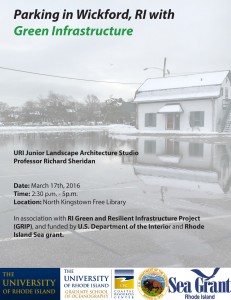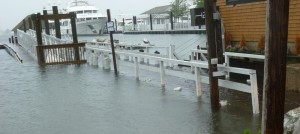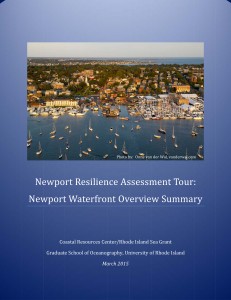Read the latest on how CRC’s coastal team has participated in the effort to save historic structures in Newport from flood water and sea level rise. Dawn Kotowicz, Teresa Crean and Pam Rubinoff have been working with the Newport Restoration Foundation, and the team will participate in the History Above Water conference in April.
Tag Archives: sea level rise
Get Fresh Ideas on Green Infrastructure and Parking March 17
 On Thursday, March 17, URI Landscape Architecture students will share their vision for re-imagining waterfront parking areas in Wickford, R.I., using green and resilient infrastructure techniques to address rising seas and storm impact.
On Thursday, March 17, URI Landscape Architecture students will share their vision for re-imagining waterfront parking areas in Wickford, R.I., using green and resilient infrastructure techniques to address rising seas and storm impact.
They will present their design ideas for Town Dock, Brown Street Parking Lot and an auxiliary parking site adjacent to the Wickford Village center. The program runs from 2:30-5:30 pm. at the North Kingstown Free Library, 100 Boone St., North Kingstown, R.I.
This project is supported with funding from the RI Green and Resilient Infrastructure Project, led by CRC with funding from the U.S. Department of Interior and National Fish and Wildlife Federation and the Rhode Island Sea Grant College Program.
To learn more contact CRC Coastal Manager Teresa Crean at tcrean@crc.uri.edu.
or 874-6626.
Beach SAMP Pilot Study to Use Coastal Risk Index Tool
At the recent Beach SAMP stakeholders meeting Rhode Island’s Coastal Resources Management Council introduced a pilot study that will use the GIS-based Coastal Environmental Risk Index (CERI) tool to determine risks to buildings and infrastructure from climate change and sea level rise impacts. The cities of Warwick and Charlestown were chosen as pilot sites as part of this Beach SAMP activity. Read more in this Westerly Sun article.
Raising Awareness about Coastal Resiliency, Sea Level Rise in Newport

CRC has worked with Newport stakeholders on sea level rise and waterfront resilience for the past five years, and this work has provided a foundation for the City, and the state, to build on. It also has captured the attention of state lawmakers and others interested in the sustainablility of Rhode Island’s coastline. Check out recent developments in the Narragansett Bay Blog and at The Providence Journal.
Beach SAMP Stakeholder Meeting is Feb. 4
The next stakeholder meeting of the R.I. Shoreline Change Special Area Management Plan (Beach SAMP) is Thursday, Feb.4, from 6 to 8 p.m. in the Coastal Institute Auditorium, Narragansett Bay Campus. The meeting will serve to update the public on project activities.
Presentations include:
- The Beach SAMP document, Introduction chapter.
- Municipal outreach in Washington County – overview of worksessions completed for five towns.
- Shoreline erosion mapping update.
- STORMTOOLS update.
- Introduction to the Coastal Environmental Risk Index (CERI), a pilot project for 2016.
Pizza will be served at 5:30 p.m. RSVP to beachSAMP@etal.uri.edu.
Register Now for ‘History Above Water’ Conference
Sea level rise as it relates to historic preservation is the topic of a conference in Newport, RI, in April. Reserve your spot now. CRC’s Dawn Kotowicz and Teresa Crean are on the program committee for the conference “History Above Water.” http://www.historyabovewater.org/
“Fortified Home” Sets New Standard in Resilient Construction
Check out Rhode Island’s first home built to “Fortified Home,” certification standards. This voluntary standard set forth by the Insurance Institute for Business and Home Safety is designed for increased resistance to storm damage. Two other homes in Rhode Island are being built or renovated to Fortified specifications, according CRC’s Pam Rubinoff. Stay tuned for more on CRC’s involvement in this important coastal resilience development.
Report on Newport Resilience Assessment Tour Completed
 CRC has recently published a report providing an overview summary of the Newport Resilience Assessment Tour (NRAT), which CRC led in the summer of 2014 along with its partners at R.I. Sea Grant and R.I. CRMC.
CRC has recently published a report providing an overview summary of the Newport Resilience Assessment Tour (NRAT), which CRC led in the summer of 2014 along with its partners at R.I. Sea Grant and R.I. CRMC.
NRAT was conducted as a climate change adaptation effort concentrating on Newport, RI, waterfront and a conducted through the participation of several businesses and organizations interested in receiving recommendations for protecting their property and assets from storm damage and sea level rise.
The assessment tour and report were completed as part of the R.I. Shoreline Change Management Plan (Beach SAMP).
CRC’s Teresa Crean Featured in Hurricane Program
CRC’s Teresa Crean is featured in WJAR Channel 10’s Hurricane 2015 special segment. Teresa discusses the online STORMTOOLS, simplified flooding maps, for assessing your property’s risk and ways to be prepared before a storm hits.
Coastal Institute/RI Sea Grant Magazine Features International Coastal Resilience Work
CRC’s work addressing coastal erosion and resilience in the less-developed world is featured in the latest issue of the URI Coastal Institute/Rhode Island Sea Grant magazine, “41 Degrees North.”


